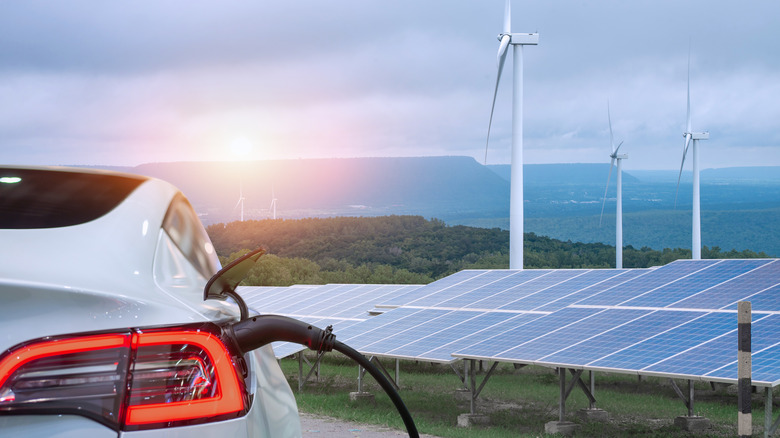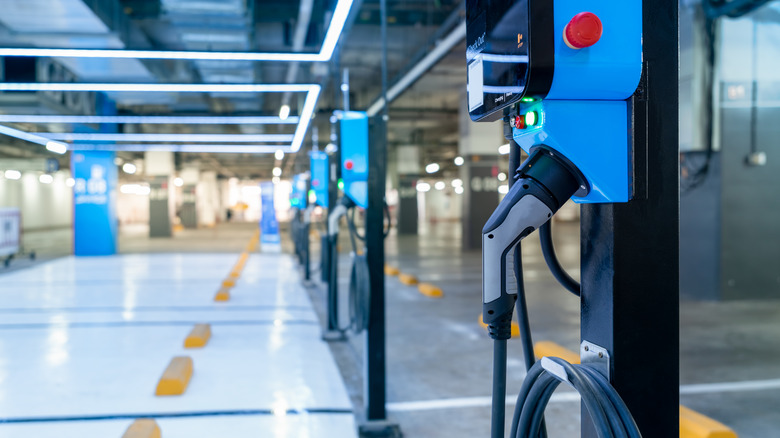These Are The Cheapest And Most Expensive States To Own An Electric Car
Electric car ownership is growing in the United States. With a nationwide turn in the direction of renewable energy resources and the fact that an electric car can be greener than a gas car, it's easy to see why more and more people are looking to bring electric vehicles into their garages to support ongoing transportation needs as well as the environment. But the convenience and accessibility of electric charging can vary greatly from one area to another.
Electricity prices can vary on a state level and across local area delineations and some state and local communities may possess less public charging infrastructure than others. Charging is already a big problem for EVs, and in some states, it's worse than in others. For instance, Electrek notes that New Jersey, Arizona, and Hawaii sport the highest car-to-public-charger figures. The marketplace is changing rapidly though, and new incentives and restrictions are making their way into federal and state-level planning for a more eco-conscious future.
Still, it's important to know where you stand financially by opting to make this switch now. Simply put, the divide between the cheapest and most expensive states to own an electric vehicle is dramatic. It should be noted, however, that Business Insider reports that both on a national average and state-by-state comparison, it is cheaper to own an electric vehicle than a gas-powered alternative. The difference lies in both purchase price and ongoing maintenance costs, and the size of savings to power the vehicle annually, resulting in a time-dependent cost of ownership comparison.
New Jersey, Oregon, Vermont, and Washington state provide the best total value for EV drivers
When it comes to the total cost of ownership, four states perform at the top of the pack in savings over a traditional gas-powered vehicle. New Jersey, Oregon, Vermont, and Washington provide annual savings of $1,931, $1,733, $1,373, and $1,337, respectively, according to Self. Each of these figures adds up to significant savings for a driver.
According to U.S. Energy Information Administration, Washington (8th) and Oregon (13th) in particular are among the cheapest states when it comes to average energy retail prices. Coupled with the fact that many of these parts of the United States have seen higher-than-average adoption of electric vehicles (via Electrek), it's no wonder that EVs provide an outsized level of savings over the typical figures experienced by drivers across the country.
These states are ahead of the curve when it comes to the economic benefits that a switch to EV ownership can provide.
Alabama, Mississippi, Michigan, and Arkansas stack up as the least cost effective states in the nation
According to Self, four states see the worst savings for EV drivers over gas vehicle owners. Alabama, Mississippi, Michigan, and Arkansas drivers can expect to save $103, $115, $211, and $229 respectively over the ongoing costs to operate a traditional combustion engine vehicle. Still, it's important to remember that even as these states don't provide nearly as much financial incentive to make the switch today, it is still cheaper to own an EV and a gas-powered vehicle when considering taxes, fuel costs, and insurance charges.
Electrek's survey of public EV charging availability reveals a lot about how vehicles are spread out across the country. For one thing, three of the four states (excluding Michigan) have significantly lower total registered EVs on the road than many others. This is a simple question of economics when it all boils down to basics. At the end of the day, a lower number of users will result in a greater dispersion of assets that make ownership even more affordable and cost-effective. The upshot of this reality is that as more drivers continue to adopt electric vehicles, these figures will continue to improve and savings will skyrocket. Considering that drivers already see savings over the use of traditional gas-powered vehicles, even in states that factor out as the least cost-effective, this momentum is already in progress.


